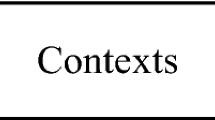This article discusses the governance architectures that facilitate and/or arise from extra information in learning outcomes. It is based on an analysis of literature and makes the connections between governance, policy, accountability, learning outcomes and information derived from learning outcomes data. The article discusses learning outcomes as an instrument of policy, a tool of governance and a source of information. The aim is to gain greater insights into higher education governance architecture associated with increased information from learning outcomes implementation. To achieve the article’s aim, I draw on a theoretical perspective of governance — agency theory (Jensen and Meckling in J Financ Econ 3(4):305–360, 1976). The article concludes that the learning outcomes are a source of information for assessing institutional performance and are at the intersection of governance, policy and pedagogy in higher education. However, learning outcomes must be carefully specified and appropriately assessed for the information to be useful and policy goals to be realized. The article ends with a call for additional comparative studies to capture learning outcomes implementation differences.
Similar content being viewed by others
References
Aamodt, P.O., Frølich, N. and Stensaker, B. (2018) ‘Learning outcomes—A useful tool in quality? Views from academic staff’, Studies in Higher Education 43(4): 614–624.
Almqvist, R., Grossi, G., Jan van Helden, G. and Reichard, C. (2013) ‘Public sector governance and accountability’, Critical Perspective on Accounting 24(7–8): 479–487.
Bauman, Z. (1992) Intimations of Postmodernity, London, New York: Routledge.
Berdahl, R. (1999) ‘University and governments in the 21st century. The US experience’, in D. Braun and F.-X. Merrien (eds.) Towards a New Model of Governance for Universities? A Comparative View, London: Jessica Kingsley, pp. 59–77.
Bevir, M. (2009) Key Concepts in Governance, London: Sage.
Bleiklie, I. (2012) ‘Collegiality and hierarchy—Coordinating principles in higher education’, in A. Nelson and I. Wei (eds.) The Global University: Past, Present and Future Perspectives, New York: Palgrave MacMillan, pp. 85–104.
Bleiklie, I., Frølich, N., Sweetman, R. and Henkel, M. (2017) ‘Academic institutions, ambiguity and learning outcomes as management tools’, European Journal of Education 52(1): 68–79.
Bleiklie, I. and Kogan, M. (2007) ‘Organization and governance of universities’, Higher Education Policy 20(4): 477–493.
Bjornavold, J. and Coles, M. (2007/2008) ‘Governing education and training; the case of qualifications frameworks’, European Journal of Vocational Training 42/43: 203–235.
Bovens, M. (2005) ‘Public accountability’, in F. Ewan, L. Lawrence Jr and C. Pollitt (eds.) The Oxford Handbook of Public Management, Oxford: Oxford Handbooks, pp. 182–208.
Brooks, S., Dobbins, K., Scott, J.J.A., Rawlinson, M. and Norman, R.I. (2014) ‘Learning about learning outcomes: the student perspective’, Teaching in Higher Education 19(6): 721–733.
Brown, M.G. (2007) Beyond the Balanced Scorecard: Improving Business Intelligence with Analytics, New York: CRC Press.
Caspersen, J. and Frølich, N. (2017) ‘Higher education learning outcomes—transforming higher education?’, European Journal of Education 52(1): 3–7.
Caspersen, J. Frølich, N. and Muller, J. (2017) ‘Higher education learning outcomes—Ambiguity and change in higher education’, European Journal of Education 52(1): 8–19.
Eisenhardt, K. (1989) ‘Agency theory: an assessment and review’, Academy of Management Review 14(1): 57–74.
Ferlie, E., Musselin, C. and Andresani, G. (2009) ‘The governance of higher education systems: a public management perspective’, in C. Paradeise, E. Reale, I. Bleiklie and E. Ferlie (eds.) University Governance: Western European Comparative Perspectives, Dordrecht: Springer, pp. 1–19.
Gibbons, M., Limoges, C., Nowotny, H., Schwartzmann, S., Scott, P. and Trow, M. (1994) The new production of knowledge: the dynamics of science and research in contemporary societies. Sage: London.
Greiling, D. and Spraul, K. (2010) ‘Accountability and the challenge of information disclosure’, Public Administration Quarterly 34(3): 338–375.
Grek, S. and Ozga, J. (2010) ‘Governing education through data: Scotland, England and the European education policy space’, British Educational Research Journal 36(6): 937–952.
Hadjianastasis, M. (2017) ‘Learning outcomes in higher education: assumptions, positions and the views of early-career staff in the UK system’, Studies in Higher Education 42(12): 2250–2266.
Halasz, G. (2017) ‘The spread of the learning outcomes approaches across countries, sub-systems and levels: a special focus on teacher education’, European Journal of Education 52(1):80–91.
Havnes, A. and Prøitz, T.S. (2016) ‘Why use learning outcomes in higher education? Exploring the grounds for academic resistance and reclaiming the value of unexpected learning’, Educational Assessment, Evaluation and Accountability 28(3): 205–223.
Hussey, T. and P. Smith (2008) ‘Learning outcomes: a conceptual analysis’, Teaching in Higher Education 13(1): 107–115.
Jensen, M.C. and Meckling, W.H. (1976) ‘Theory of the firm: managerial behavior, agency costs and ownership structure’, Journal of Financial Economics 3(4): 305–360.
Kennedy, D., Hyland, A. and Ryan, N. (2007) Writing and Using Learning Outcomes: A Practical Guide, Cork: University College Cork.
Kivisto, J. (2008) ‘An assessment of agency theory as a framework for the government–university relationship’, Journal of Higher Education Policy and Management 30(4): 339–350.
Kivisto, J.A. (2007) Agency theory as a framework for the government-university relationship, Tampere: Higher Education Group/Tampere University Press.
Lane, J. (2005) State oversight of higher education: A theoretical review of agency problems with complex principals. Paper presented at the annual conference of the Association for the Study of Higher Education; 17–19 November, Philadelphia, PA, USA.
Lane, J. E. and Kivisto, J. A, (2008) ‘Interests, information, and incentives in higher education: principal-agent theory and its potential applications to the study of higher education governance’, in J. C. Smart (ed.) Higher Education: Handbook of Theory and Research, Dordrecht: Springer, pp. 141–174.
Lassnigg, L. (2012) ‘Lost in translation’: learning outcomes and the governance of education’, Journal of Education and Work 25(3): 299–330.
Lawn, M. (2011) ‘Governing through data in English education’, Education Inquiry 2(2): 277–288.
Liefner, I. (2003) ‘Funding, resource allocation, and performance in higher education systems’, Higher Education 46(4): 469–489.
Liu, O.C., Bridgeman, B. and Adler, R.M. (2012) ‘Measuring learning outcomes in higher education: motivation matters’, Educational Researcher 41(9): 352–362.
Lyne, M. and Tierney, M. (2003) The politics of common agency: Unitary, multiple and collective principals. Paper presented at the annual meeting of The American Political Science Association; 27 August; Philadelphia, PA, USA.
Mandinach, E. B. (2012) ‘A perfect time for data use: using data-driven decision making to inform practice’ Educational Psychologist 47(2): 71–85.
Martin, L. and Mahat, M. (2017) ‘The assessment of learning outcomes in Australia: finding the holy grail’, AERA Open 3(1): 1–19.
Melguizo, T. and Wainer, J. (2016) ‘Toward a set of measures of student learning outcomes in higher education: evidence from Brazil’, Higher Education 72(3): 381–401.
Michelsen, S., Vabø, A., Kvilhaugsvik, H. and Kvam, E. (2017) ‘Higher education learning outcomes and their ambiguous relationship to disciplines and professions’, European Journal of Education 52(1): 56–67.
Michelsen, S., Sweetman, R., Stensaker, B. and Bleiklie, I. (2016) ‘Shaping perceptions of a political instrument: the political-administrative formation of learning outcomes in higher education in Norway and England’, Higher Education Policy 26(3): 399–417.
Moe, T.M. (2005) ‘Power and political institutions’, Perspectives on Politics 3(2): 215–234.
Neave, G (1998) ‘The evaluative state revisited’, European Journal of Education 33(3): 265–284.
Pina, V., Torres, L. and Royo, S. (2007) ‘Are ICTs improving transparency and accountability in the EU regional and local governments? An empirical study’, Public Administration 12(9): 449–472.
Prøitz, T.S. (2015) ‘Learning outcomes as a key concept in policy documents throughout policy changes’, Scandinavian Journal of Educational Research 59(3): 275–296.
Rabossi, M. (2017) ‘Agency costs in higher education: evaluating an institution through a comprehensive framework’, Higher Education Policy 30(3):319–339.
Saliterer, I and Korac, S. (2013) ‘Performance information use by politicians and public managers for internal control and external accountability purposes’, Critical Perspectives on Accounting 24(7–8): 502–517.
Shattock, M. (2008) ‘The change from private to public governance of British higher education: its consequences for higher education policy making 1980–2006’, Higher education Quarterly 62(3): 181–203.
Shore, C. and Wright, S. (2015) ‘Governing by numbers: audit culture, rankings, and the new world order’, Social Anthropology 23(1): 22–28.
Souto-Otero, M. (2012) ‘Learning outcomes: good, irrelevant, bad or none of the above?’, Journal of Education and Work 25(3): 249–258.
Spekle, R.F. and Verbeeten, F.H.M. (2014) ‘The use of performance measurements systems in the public sector: effects on performance’, Management Accounting Research 25: 131–146.
Stanley, J. (2015) ‘Learning outcomes—from policy discourse to practice’, European Journal of Education 50(4): 404–419.
Ure, O.B. (2015) ‘Governance for learning outcomes in European policy-making: qualification frameworks pushed through the open method of coordination’ International Journal for Research in Vocational Education and Training 2(4): 268–283.
Weick, K. (1979) ‘Educational organizations as loosely coupled systems’, Administrative Science Quarterly 21(1): 1–19.
Wohlstetter, P., Datnow, A. and Park, V. (2008) ‘Creating a system for data-driven decision-making: applying the principal-agent framework’, School Effectiveness and School Improvement: An International Journal of Research, Policy and Practice 19(3): 239–259.
Author information
Authors and Affiliations
Corresponding author
Ethics declarations
Conflict of interest
The author declared no potential conflicts of interest with respect to the authorship and publication of this article.
Additional information
Publisher's Note
Springer Nature remains neutral with regard to jurisdictional claims in published maps and institutional affiliations.
Rights and permissions
About this article
Cite this article
Austin, I. Governance Architectures in Higher Education Arising from Extra Information on Learning Outcomes. High Educ Policy 32, 617–637 (2019). https://doi.org/10.1057/s41307-019-00166-w
Published:
Issue Date:
DOI: https://doi.org/10.1057/s41307-019-00166-w




